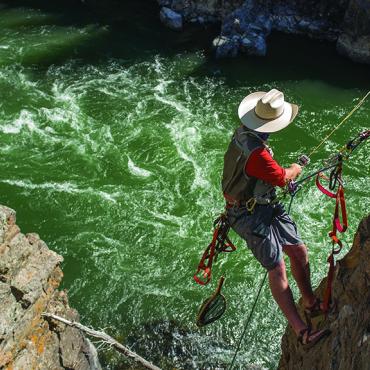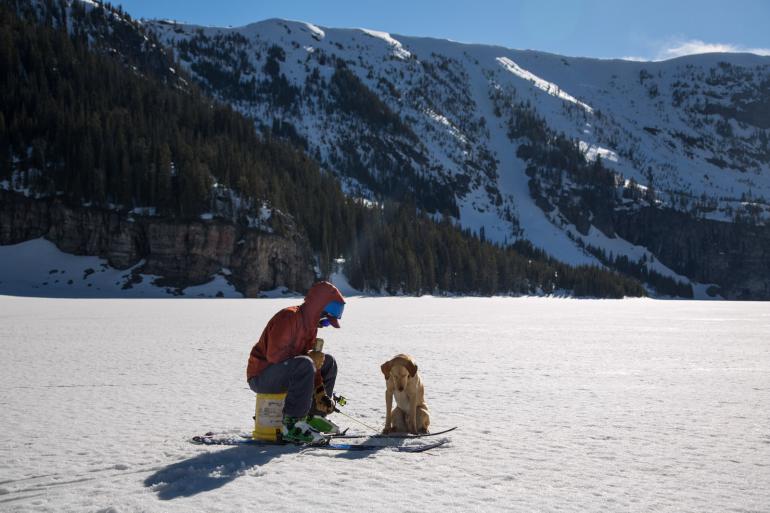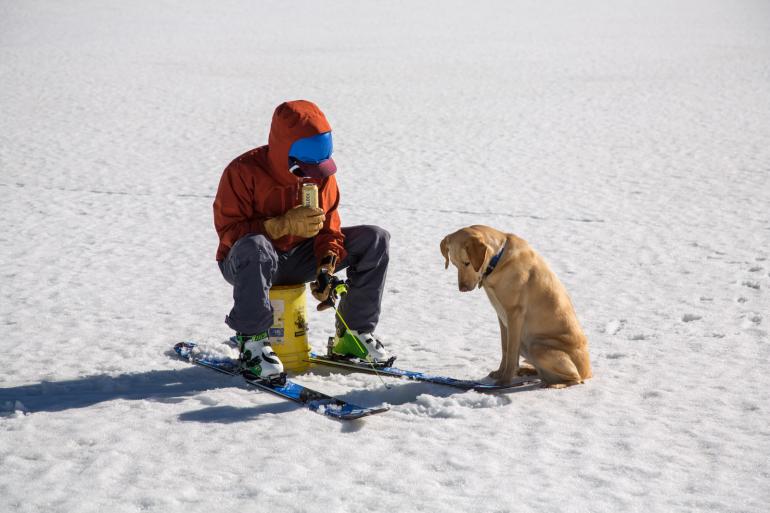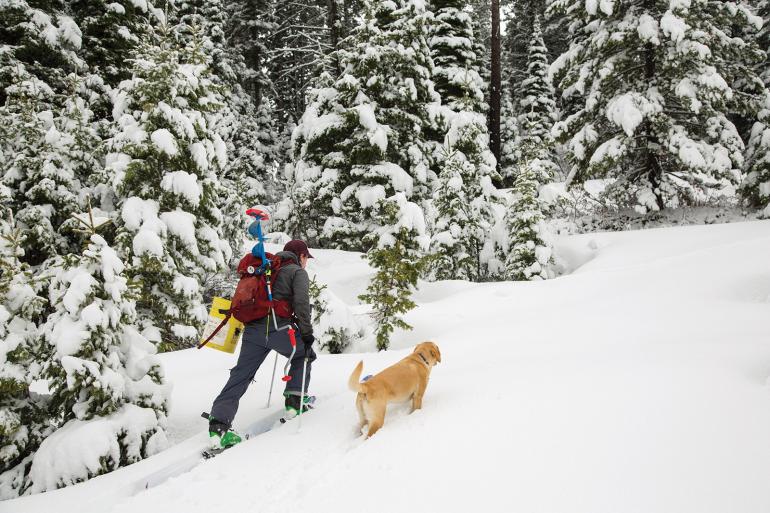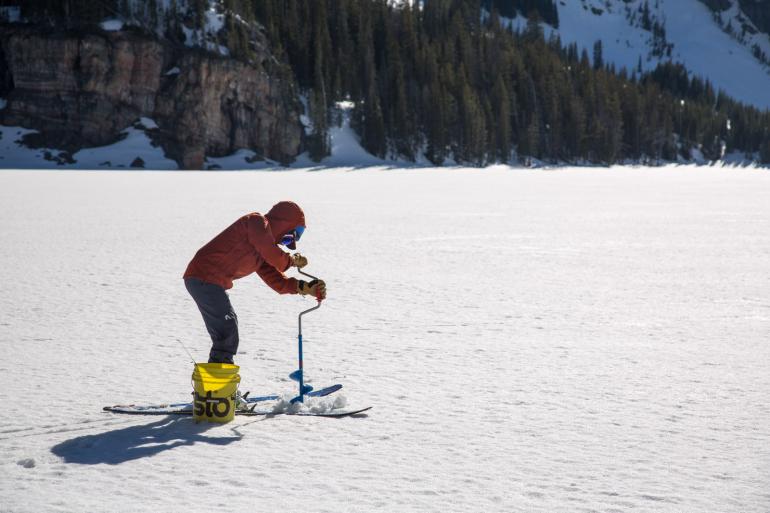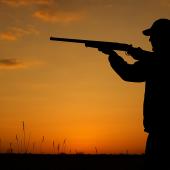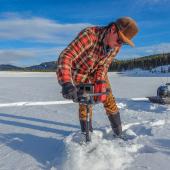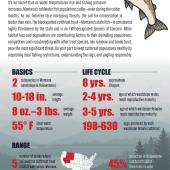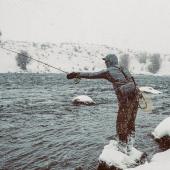Icers Gettin' High
Winter fishing reaches new heights.
For most people, backcountry skiing is adventure enough—the physical challenge, the danger of avalanche, the exposure to the elements. But for a small group of Montana pioneers, backcountry skiing is just the beginning. Carrying up to 40 pounds of gear each—ice augers, tackle boxes, fish finders, and the weight of self-determination—they seek out the highest, most remote alpine lakes in order to test their mettle against Montana’s wild trout. They call it alpine ice fishing, and in Bozeman, where trendiness reigns supreme, it could be the next big thing in winter recreation.
The premise is simple enough: find high-alpine lakes that are difficult to access in winter, drill a hole, and fish them. In practice, however, alpine ice fishing is anything but simple. “You got your ski gear, your auger, your cooler, your rod and reel—a whole lotta’ crap you gotta get to the lake,” explains Bob Erandsenker, an alpine ice-fishing legend and president of Bozeman’s Mountain Ice Fishing Federation (MIFF). “And it’s dangerous. I mean, you got avalanches, you got frostbite, you got cougars in them hills, and the lake’ll kill ya dead, if you ain’t payin’ attention.”
The reward for all of these trials and tribulations? At best, a few small, lethargic trout. But like any sport on the fringe, alpine ice fishing isn’t about the fish you take home—it’s about pushing the limits of what’s possible with a fishing rod. A tiny, tiny fishing rod.
“We get excited about making the impossible, possible,” Erandsenker says. “Nobody thought we could drill this lake, but here we are. We drilled it, and now we’re fishin’ it. It don’t matter if we catch anything—it’s all about the challenge.”
Growing up in Des Plaines, Illinois, Erandsenker thought he had it made, with a modest ice shanty on a productive lake, a few camp chairs, and a cooler full of beer. “We had a lot of fun out there. Just some decent guys, sitting around in the dark, drinking Schlitz in silence and jiggin’ walleye like madmen. I mean, super good times, right? But even all that wasn’t enough.”
Now, Erandsenker and his small posse of dedicated alpine ice anglers have explored dozens of frozen lakes throughout the Gallatin, Madison, and Beartooth ranges. They’ve hauled their gear to over 9,500 feet, and drilled some unlikely bodies of water—and they’ve had their share of failures. “One time, somewhere up the Beartooth, I drilled and drilled and drilled,” says Buck Etthead, another local alpine ice fisher. “I never did hit water. That damned lake froze full up!”
Another time, Erandsenker froze his boots right into the ice after a particularly cold “sit,” and had to chisel himself out with a filet knife. “There’s a lot that can go wrong,” he admits. “It’s not for the meek.” In fact, part of the attraction is the opportunity to dispel common stereotypes about ice fishing.
According to Erandsenker, ice fishing gets a bad rap in Montana. “People say, ‘Oh, those guys just want to get away from their wives and drink beer.’ And ‘Ice fishermen are lazy,’ and ‘What the hell is wrong with those idiot ice fishermen?’ But that’s only 99% of ice fishermen. Mountain icers are doing something else. We’re pushing ourselves to the extremes of our sport; progressing past the boundaries. I wake up every day and ask myself, ‘Bob, what’s possible in ice fishing?’ And I aim to find out how far we can take this thing.”
To that end, Erandsenker’s been designing a lightweight, collapsible, carbon-fiber ice auger to save weight. “We’re really the alpinists of the fishing world,” he explains. “So we’re taking this whole ‘fast and light’ thing seriously.” They’ve developed an alpine ice fishing fitness program, which they’ve pitched to local gyms, though none have accepted as of yet. And they’ve started an outreach program aimed at attracting women and young people to the sport.
Alpine ice fishing is a new take on an old pastime, and it’s been slow to catch on in the mainstream. Carrying heavy loads of gear into the mountains and sitting still for hours in the cold isn’t everyone’s cup of tea, but MIFF is trying to change that. “There’s something spiritual about lookin’ down that dark hole,” Etthead says. "Everything else disappears—the hard climbs, the heavy loads, the cold, the wind, the loneliness, the three divorces—it’s all gone. There’s nothing else in the world but the possibility of what might come out of that hole. I mean, probably it’ll be a fish, but you know, metaphysically speakin’. It’s pretty special.

